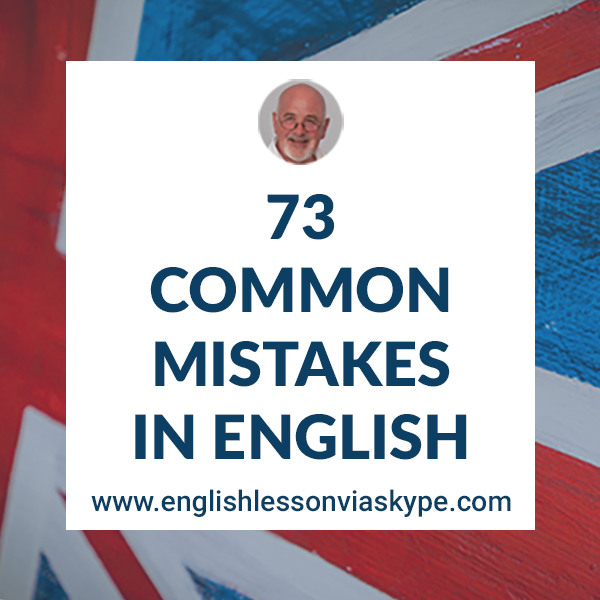Here are I have 13 English phrasal verbs with OFF for you. Most people when looking at such phrasal verbs with OFF will give the more common forms as examples such as:
- break off – to end
- tear off – to rip
- switch off – to turn off something (light, for example)
Therefore I thought I might look at a few less well-known phrasal verbs using the preposition OFF with some examples.
Listen to the podcast Speak Better English with Harry or watch it on YouTube at Learn English with Harry. englishclass101
List of Phrasal Verbs
Phrasal Verbs with OFF
shake off something meaning - video lesson
Harry
Learning phrasal verbs is an essential part of improving your English vocabulary, especially for students who are preparing for language proficiency exams like IELTS and TOEFL.
Among the many phrasal verbs, those with the preposition “off” can be particularly challenging to master, as they can have a variety of meanings and uses.
However, mastering these phrasal verbs can greatly improve one’s English speaking skills and ability to communicate effectively.
In this lesson, we will explore some common phrasal verbs with “off” and provide examples of how they are used in context, with the aim of helping English language learners expand their vocabulary and become more confident speakers.
Phrasal Verbs with OFF

cut off
Literally to cut off means to take a knife or scissors and cut a piece of meat or cloth or material from an article.
Example:
He cut a piece of meat off and gave it to the dog.
However, to be cut off can also have other meanings.
to be cut off – to have no access in or out, to be disconnected
Example:
Heavy rains caused the river to quickly overflow its banks and 2 local villages have been cut off.
to cut someone off
Meaning: to prevent someone from receiving something
Example:
Joe had an argument with his father. The father threatened to cut him off without a penny unless Joe agrees to do as he requests.
pass off
Meaning: to pretend or deceive someone into thinking something is true when it is not
Example:
Sarah was desperate for money. She advertised her fake bag online hoping she could pass it off as the real thing.
improve english on a budget
Online English Courses from €7.99
break off
Meaning: to end a relationship or agreement
Example:
Have you heard the news? Sarah broke off her relationship with Peter last week.
come off
Meaning: to succeed, to work out
Example:
Despite all their efforts, the deal didn’t come off.
The concert came off without a hitch, and the audience was thrilled with the performers’ talent and energy.
back off
Meaning: to move away from someone or something, or to stop doing something that is annoying or causing problems
Example:
I wish my boss would back off and let me work in peace.
shake off
Meaning: to get rid of something that is unwanted, such as a bad habit or a feeling
Example:
I can’t seem to shake off this cold that I’ve had for weeks.
Less Well-Known Phrasal Verbs with OFF
stop off
Meaning: to make a short break in a journey
Example:
We stopped off at an old castle for some site seeing.
start off
Meaning: to cause something to begin
Example:
Well done to our U12 boys who started off the season with a super win over ABC United.
finish off (with)
Meaning: to destroy, to kill someone or to complete something
Example:
It was a great meal, we finished off with coffee and mints.
brush off
Meaning: to dismiss or ignore something or someone, often in a rude or condescending way
Example:
The teacher brushed off my question and didn’t give me a clear answer.
rip off
Meaning: to cheat or overcharge someone, usually in a transaction or a deal
Example:
I felt like I got ripped off when I bought this expensive sweater that fell apart after one wash.
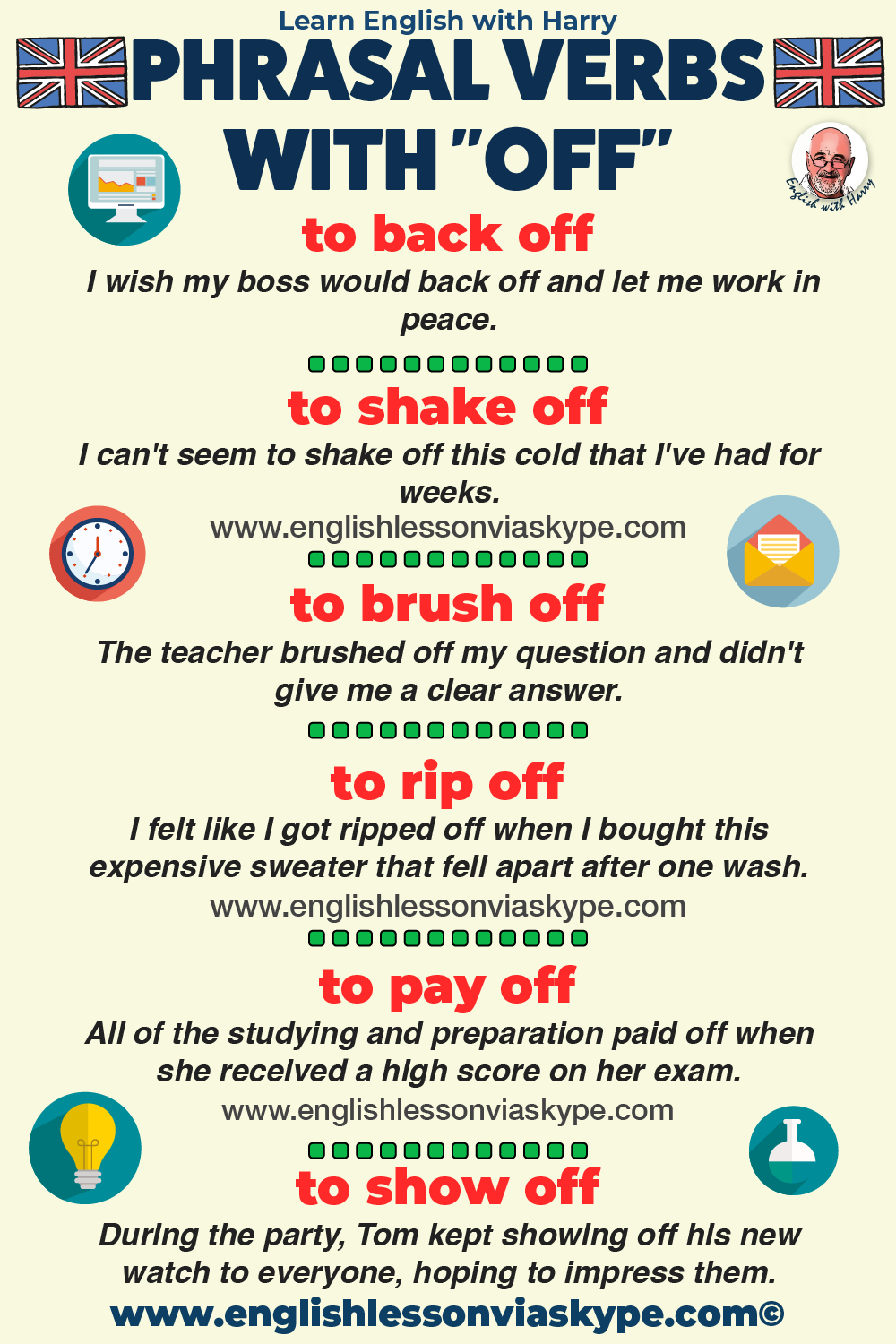
bounce off something
Meaning: to discuss something (idea, plan) with somebody in order to get their opinion
Example:
I just want to bounce this off you before I proceed.
bounce off something meaning - video lesson
give off
Meaning: to emit, to produce a smell, heat, fumes, etc
Example:
There was some food inside the microwave that gave off a terrible smell.
palm off
Meaning: to dismiss someone’s questions with non-committal or untrue answers
Example:
Peter thinks he can palm me off with any excuse, but he’s wrong. I want to know the truth.
cry off
Meaning: to cancel or back out of a commitment or agreement, often at the last minute, usually because of illness or other personal reasons.
Example:
Jane had to cry off the dinner party at the last minute because she came down with the flu.
pay off
Meaning: to yield a positive result or reward, often after hard work or effort
Example:
All of the studying and preparation paid off when she received a high score on her exam.
Less Well-Known Phrasal Verbs with OFF
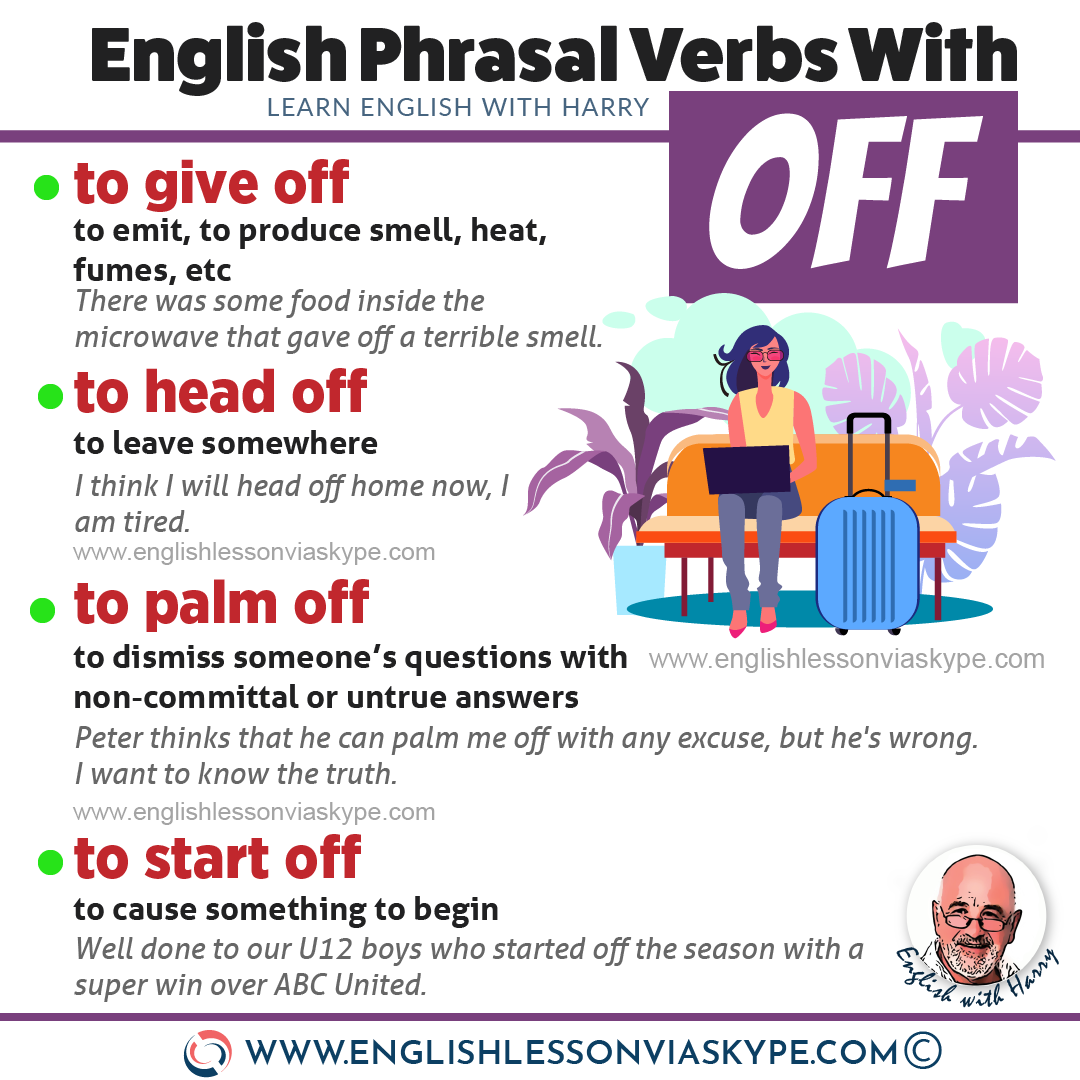
make off with
This is often used to describe a situation where a robbery takes place and the robbers or thieves run away with whatever they had targeted.
Example:
The robbers spent 2 days over the weekend tunnelling (digging) under the bank. They got into the safe without much difficulty and took a lot of cash and other valuables with them. The police estimated that they had made off with over $1m. !
head off
1. If we decide to go away for a few days or on a longer holiday we can use this phrasal verb to let people know what we are doing.
Example:
I am going to head off for a few days to England.
2. We can also use it in more general terms to indicate we are going to leave somewhere.
Example:
I think I will head off home now, I am tired.
3. Finally, it can also be used to try to block someone from progressing with an idea or a plan.
Example:
I do not like the boss’s idea to expand the business so quickly. “Don’t worry” – his colleague says. “I will talk to him tomorrow and try to head him off (change his mind) before he goes too far”.
book your trial English Lesson
Phrasal Verbs with OFF
back off meaning - video lesson
More Information
As you probably already know, phrasal verbs are mostly used in spoken English. One of the ways to improve your speaking skills in English is to learn commonly used phrasal verbs. Unfortunately, there are no tips to learn phrasal verbs easily. However, I hope some of my other posts will make learning a little bit easier for you.
Phrasal Verbs with FALL and their meanings
You can always study English advanced level at Learning English with the BBC and British Council Learn English.
You will love these English lessons
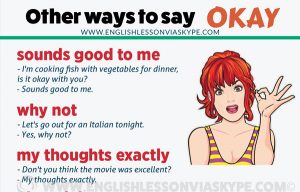
Other Ways to Say Okay in English
Do you know other ways to say Okay in English? Okay, or OK is a very basic word of acceptance
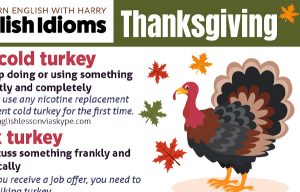

Idioms and Phrases related to Thanksgiving
Improve your English and learn idioms and phrases related to Thanksgiving. We’ll kick off with phrases. Scroll down to learn


10 Idioms about Health and Illness
There are many idioms about health and illness in the English language. As much as we all want to stay
